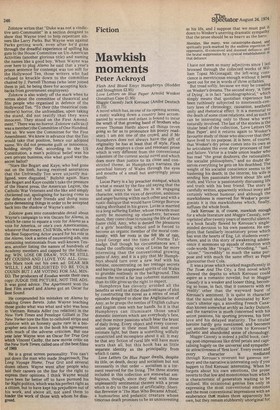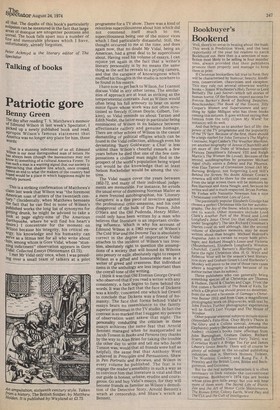Fiction
Mawkish moments
Peter Ackroyd
Flesh And Blood Emyr Humphreys (Hodder and Stoughton £2.95) Love Letters on Blue Paper Arnold Wesker (Jonathan Cape £1.95) Maggie Cassidy Jack Kerouac (Andre Deutsch £1.75)
A novel which has, as one of its opening scenes, a rustic walking down a country lane accompanied by woman and infant is bound to incur the wrath of that growing band of brothers who revere Thomas Hardy above all things (even going so far as to pronounce his poetry readable). I am not one of the crowd, and if Mr Humphreys does not always have the gift of originality he has at least that of style, Flesh And Blood employs a close and resonant prose which is very different from the conventional tokenism of the current social novel and which does more than justice to its close and constricted theme, as Humphreys narrates the parochial history of Wales through the eyes and mouths of a small but annoyingly pious family.
Lucas Parry is a lay preacher manqué, which is what is meant by the fine old. saying that the last will always be last. He is an engaging character, with the vices of devotion, ambition and anger burning within each other and with a rustic dialogue that would have George Borrow taking shorthand in his grave. Lucas is married to a long suffering Esther, whose rewards must surely be mounting up elsewhere; between them, they come close to ruining the life of their foster child, Amy, who is denied the pleasures of a girls' boarding school and is forced to become an organic member of the moral community, with her roots in the felt life of rain, Lloyd George and the tiiins of Norma Talmadge. Dull though his circumstances are, I found the conflicting vices of Lucas far more interesting than the conventional growing pains of Amy, and it is a pity that Mr Humphreys should turn over a new leaf with his heroine, concentrating on her teenage secrets and leaving the unappeased spirits of old Wales to grumble restlessly in the background. This makes the novel a far less coherent statement than its title gives us the right to expect.
Humphreys has cleverly avoided all the benefits as well as all the disadvantages of plot by constructing the novel as a series of small episodes designed to show the Anglicisation of Amy, as he grasps the nettles of English culture and English class with her hands. So it is that Humphreys can illuminate those small domestic interiors which are everybody's fate, and those minor passions which bear the brunt of daily living. Every object and every conversation appear in their most blunt and most intimate light, but there is something wilfully constricted and incomplete about it all. It may be that any fiction of rural life will have more warts than all, but this book has as little separate identity as the principality from which it came.
Love Letters On Blue Paper dwells, despite its title, on death, decay and socialism but not necessarily in that order — socialism is a torment reserved for the living. The three stories included in this collection are somewhat ambiguous, though, since they deal with these unpleasantly sentimental themes with a prose which is dry to the point of artificiality. Sheridan Brewster is 'The Man Who Became Afraid,' a humourless and pedantic creature whose timorous death promises to be as uninteresting as his life, and I suppose that we must put it down to Wesker's unerring dramatic sympathy that the prose should be as heavy as the hero:
Shendan, like many, was catastrophe-dazed, and spiritually pock-marked by the endless repetition of oppression, ill-conceived and doomed defiance, and the brutal suppression by a cynical establishment ot that defiance.
I have not seen so many adjectives since I last browsed through the collected works of William Topaz McGonagall; the left-wing conscience is meretricious enough without it being spent out for me in words of three syllables. But tread softly, because we may be treading on Wesker's dreams. The second story, 'A Time of Dying', is in fact "autobiographical," which simply means that quotidian experience has been ruthlessly subjected to nineteenth-century laws of chronology, causation, aesthetic unity and rhetorical effect. It is a memorial to the death of some close relations, and as such it can be interesting only to those who were naturally involved. The last of the stories is the titular head of the collection, 'Love Letters On Blue Paper', and it returns again to Wesker's favourite study of those who discover that they have lived to no purpose. It is here, of course, that Wesker's dry prose comes into its own as he articulates the even dryer processes of fear and failure. Victor is a trade union leader who has read "the great doubters, the rationalists, the socialist philosophers," and no doubt deserves everything he gets on his deathbed. The weight of his socialist conscience seems to be hastening his death; in the interim, his wife is sending him passionate letters about life and truth, and Victor is passionately discussing life and truth with his best friend. The story is carefully written, apparently without irony and certainly without humour, and although the mawkishness is reserved for Wesker's protagonists it is this mawkishness which, finally, suffuses the whole book.
Jack Kerouac is, of course, mawkish enough for a whole literature and Maggie Cassidy, now reprinted after twenty years of merciful silence, is a book fatally flawed by Kerouac's singleminded devotion to his own passions. He employs that familiarly incantatory prose which has won the hearts of Eng. Lit. students everywhere, and in this story of awakening adolescence it summons up squads of emotion with code-words like "tragic," "brooding," "sad," "alone," "incredibly" to much the same purpose and with much the same effect as Pepsi glamourise their Cola. It was a prose which worked magnificently in The Town And The City, a first novel which showed the depths to which Kerouac could aspire as a romantic novelist, but in Maggie Cassidy it is a weaker and looser thing, becoming so loose, in fact, that it connects with no 'reality' other than the wayward burst of
Kerouac's sentiment. It is quite in character that the novel should be dominated by Ker ouac's ulterior ego, a snivelling French Cana dian known somewhat archly as Jacky Duluoz, and the narrative is much concerned with his secret passions, his sporting prowess, his first love and his delayed maturity. The titular heroine hardly gets mentioned, and becomes yet another sacrificial victim to Kerouac's
pathetic and abandoned sense of chronology. Maggie Cassidy is indeed a pallid book, casting post-impressions like dried petals and capi
talising hugely on the universal and sympathe tic attractiveness of 'first love'. Every event and every character is mediated.
through Kerouac's reverent but gaseous me mory and the narrative is interesting only if you happen to find Kerouac interesting. When he
forgets about his own emotions, the prose reverts to that low and monotonous hum which is characteristic of generators waiting to be utilised. His occasional genius lies only in expressing the most conventional emotions and the most conventional impressions with an exuberance that makes them apparently his own, but they remain stubbornly unoriginal for
all that The depths of this book's particularly solipsism can be measured in the fact that large areas ot dialogue are altogetner pointless anti unreal, The book falls apart into a number of fine and memorable phrases which I have, unfortunately, already forgotten.
Peter Ackmyd is the literary editor of The Spectator



































 Previous page
Previous page